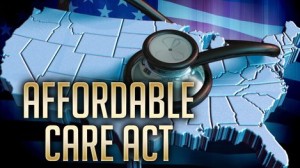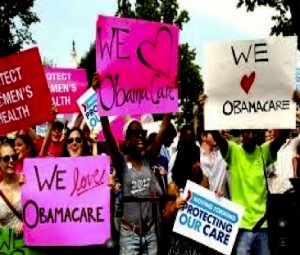In honor of Black History Month, the Diverse Elders Coalition is featuring stories relevant to black aging during February. A new story will be shared every Wednesday, with additional posts shared throughout the month. Be sure to visit diverseelders.org regularly during the month of February.
Black history month reminds us that African Americans come from ancestors with a legacy of overcoming obstacles far and wide. Five decades since the oppressive days of Jim Crow, African Americans have a lot to celebrate— achievements in science, business, government, medicine, arts, sports, and a two-term elected president of the United States who delivered on his promise to provide universal healthcare to all Americans.
 Originally written with the premise of putting consumers back in control of their healthcare, the Affordable Care Act required all states to assist its residents by expanding their Medicaid program’s to their residents with incomes below $16,000 ($32,000 for a family of four), with the understanding that the federal government would foot most of the bill.
Originally written with the premise of putting consumers back in control of their healthcare, the Affordable Care Act required all states to assist its residents by expanding their Medicaid program’s to their residents with incomes below $16,000 ($32,000 for a family of four), with the understanding that the federal government would foot most of the bill.
Upon enactment, opponents took dead aim at the legislation. Coining the Affordable Care Act “Obamacare”, opponents tirelessly worked to repeal and replace the law. After years of heated public bickering, countless rallies, and a Supreme Court decision that finally declared the Affordable Care Act constitutional, but also gave states the option to opt out of expanding their Medicaid programs, southern states such as, Alabama, Georgia, Louisiana, Mississippi, North Carolina, South Carolina, Tennessee, and Texas decided to forgo Medicaid expansion, leaving thousands without healthcare coverage.
How does opting out of Medicaid expansion impact low-income, childless African American adults? Opting out of Medicaid expansion means, hundreds of thousands of low-income, childless African American adults are ineligible to receive healthcare through Medicaid, and are also ineligible for the subsidized health
low-income, childless African American adults? Opting out of Medicaid expansion means, hundreds of thousands of low-income, childless African American adults are ineligible to receive healthcare through Medicaid, and are also ineligible for the subsidized health insurance offered by the Affordable Care Act
insurance offered by the Affordable Care Act
Adding insult to injury, because the above-mentioned states opted out of Medicaid expansion, community health centers in those regions who tend to serve the people at or below the federal poverty level don’t have the capacity to improve upon their existing services.
Why are the opponents outraged about the Affordable Care Act? There are tons of theories, but no one quite knows why there is so much outrage and opposition towards Medicaid expansion under the Affordable Care Act. Some believe the act violates the Constitution even after the Supreme Court voted different. Others believe the law will cost employers more money, especially small business owners. Another theory is that opponents don’t like the tax increases that are necessary to pay for the Affordable Care Act, and the more common theory is that the opposition hates anything associated with President Obama.
Dissension aside, no one can deny, including the law’s opponents that the spirit of the Affordable Care Act stands to provide universal healthcare to tens of millions of uninsured Americans.
The beauty of America is that you don’t have to agree with a particular party, candidate, or even the president. Nevertheless, if we’re a country that touts freedom, diversity, inclusiveness, and prosperity for all, what’s so inclusive about denying a low-income, childless African American woman a free-lifesaving mammogram? As it stands, African American women have fewer incidences of breast cancer, but a higher death rate from the disease. This is in part because black women have never had the same access to mammograms that their white counterparts have seemingly always had.
Who prospers when a low-income, childless African American man is denied access to a preventative health screening that reduces the risk factors associated with dying young, or a routine annual physical that promotes healthy living, eating healthy foods, staying physically active, and the importance of regular routine checkups?
And, then there is HIV/AIDS. Where’s the freedom, diversity, inclusiveness, and prosperity for all when anyone regardless of their race or socioeconomics succumbs to AIDS? Under the Affordable Care Act, all Americans including low-income, childless African American adults can now get the care they need without being subjected to insurance industry abuses from the past.
What Happens Now? No one seems to know what happens next with the Affordable Care Act. As it stands, thousands of Americans have flocked to enroll in the insurance programs. Regardless of how the pundits spin it, the Affordable Care Act bears no resemblance to a socialist program, but in fact is a program that gives every American the opportunity to prosper by assuring their own well-being.
As African Americans continue to celebrate the triumphs of yesteryear, it’s important for all Americans, particularly African Americans to remember that our work is not done. It’s time for Americans to come together to unhinge the opposition, and do whatever we can to eradicate the unjust disparities in access to the Affordable Care Act so that every American, including low-income, childless African American adults can exercise their right to freedom, diversity, inclusiveness, prosperity—and HEALTHINESS that lays the cornerstone for a healthier generation of African Americans to come.
The opinions expressed in this article are those of the author and do not necessarily reflect those of the Diverse Elders Coalition.
READ OUR OTHER BLACK HISTORY MONTH STORIES:
You won’t believe what I learned from our black elders (Black History Month)
10 things Black Americans should know about HIV/AIDS (Black History Month)
35 quotes to help guide your life from famous African American older adults (Black History Month)
When the Healer is not Healed – The Pain of Losing a Child in Your Later Years (Black History Month)
Fund more Alzheimer’s studies, a high black risk (Black History Month)

